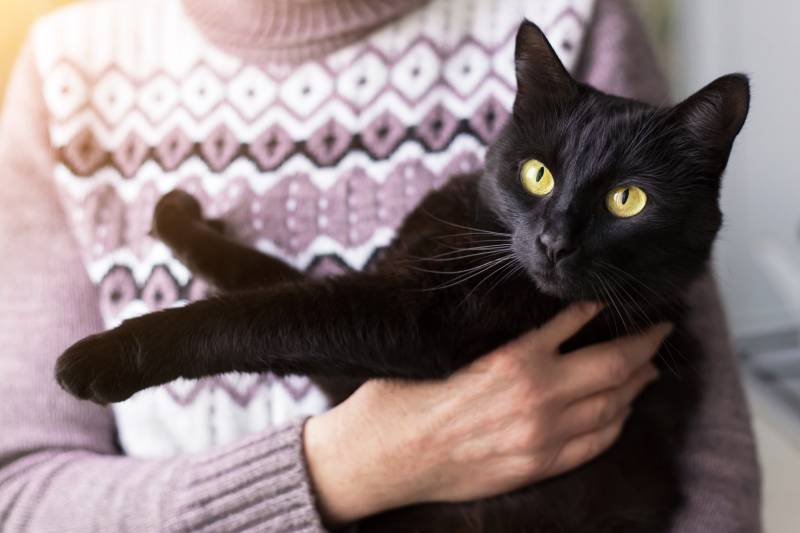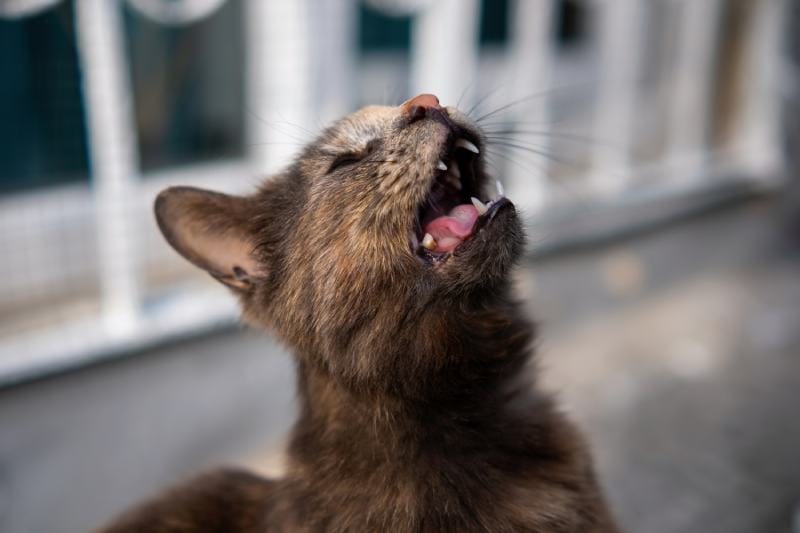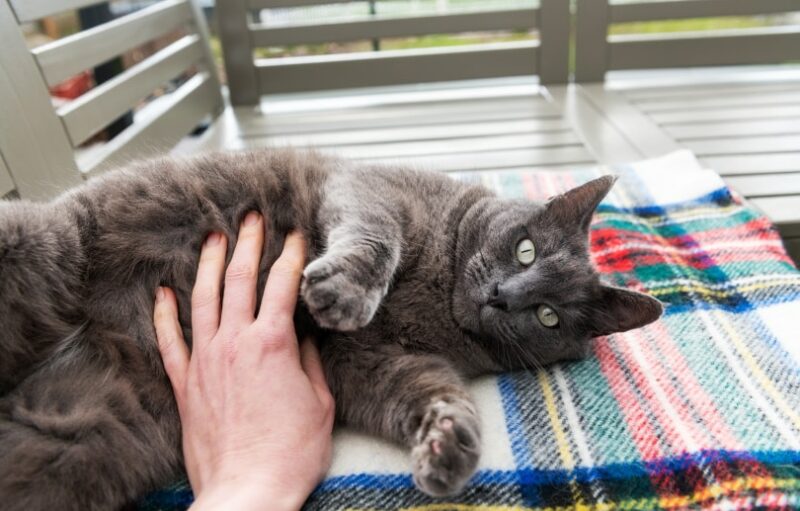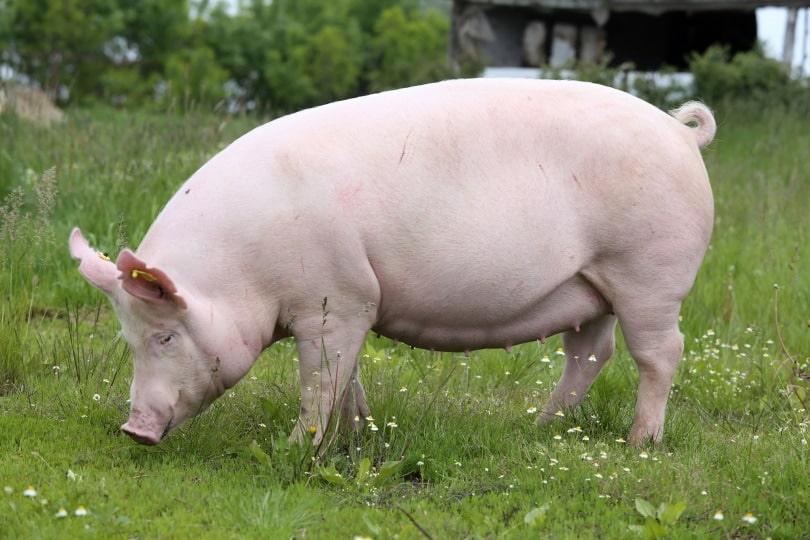VET APPROVED

The information is current and up-to-date in accordance with the latest veterinarian research.
Learn more »Click to Skip Ahead
The Bombay cat is a lively feline that looks like a mini panther with its sleek jet-black coat and bright yellow eyes. Aside from their exotic appearance, the Bombay cat is known for their intelligence and playful temperament which makes them a good companion animal. They have a similar life expectancy and care needs as any other domesticated cat.

Bombay Cat Average Lifespan
The average lifespan of a Bombay cat is between 12 and 20 years. Some Bombay cats have been known to exceed that age and live up to 20 years old with proper care, access to medical treatment, and good genetics.

How to Care For Your Bombay Cat for a Long Lifespan?
Proper care is essential if you want your Bombay cat to be healthy enough to live their full lifespan.
Feeding & Diet
The Bombay cat is an obligate carnivore that needs to eat a diet primarily consisting of animal-based protein. Your Bombay cat must be eating a nutritionally balanced diet that is appropriate for their species.
Bombay cats can be fed either wet, dry, or fresh foods if they are complete and contain all the vitamins and minerals they need for survival. The main ingredient in your Bombay cat’s food should be high-quality and digestible meat like poultry, beef, or pork. You can offer your Bombay cat food according to their life stages (kitten, adult, senior), or as advised by your veterinarian.
High-quality cat food is an important part of fostering a long and healthy life for your cat but the right cat food and water dish will promote good posture, offer whisker relief, and aid in good digestion. The Hepper NomNom Cat Bowl is our favorite bowl since it offers all of the above and is beautifully crafted to meet modern home stylings. The wide tray design catches any food and water spills and the entire setup is dishwasher safe. Learn more about the Hepper NomNom Cat Bowl here. At PangoVet, we’ve admired Hepper for many years and decided to take a controlling ownership interest so that we could benefit from the outstanding designs of this cool cat company!
Environment
Bombay cats should always be kept in a safe environment where they are not put in danger. You can either keep them as an indoor or outdoor cat but indoors are the safest place your Bombay cat can be. There is countless supporting evidence that cats live longer and healthier lives indoors.1
If you choose to allow your Bombay cat to free roam outdoors, you might be putting them at more risk than you have been led to believe. Outdoor Bombay cats are at risk of getting injured or killed by predators, vehicles, toxins, and contracting infectious diseases that may shorten their lives.
Furthermore, outdoor cats can contribute to feral cat populations and interfere with the local wildlife. If you want to allow your Bombay access outdoors, it is best to invest in a catio or keep the yard secure to prevent it from escaping.
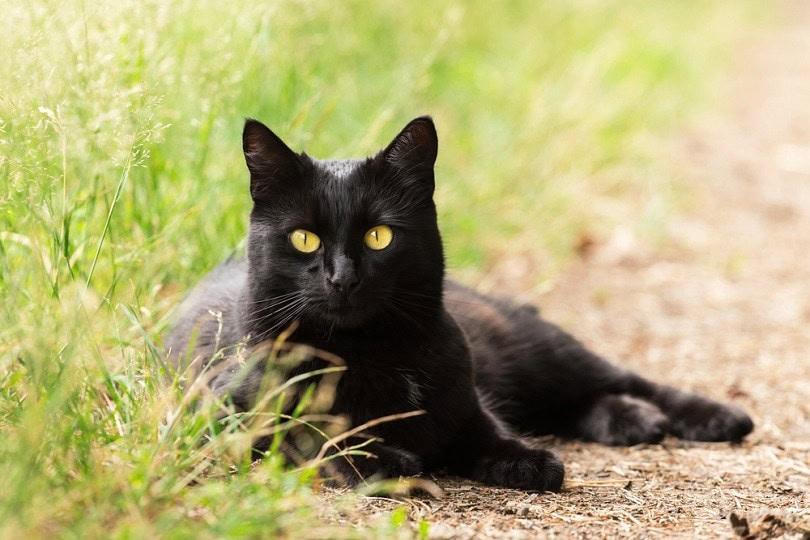
Care
When you decide to take on a Bombay cat as a pet, you are committing to caring for them for the next up to 20 years of their life. While caring for a Bombay cat can seem as simple as feeding and petting them, there are more responsibilities involved.
Caring for a Bombay cat involves:
Regular play sessions can help your cat stay happy and healthy. Why not start the play with a fun toy like Hepper's Catnip Stick Toy? These sturdy toys are double-bagged, bite-proof, and filled with 100% organic catnip. Choose your favorite pastel color and treat your cat to hours of fun!
At PangoVet, we've admired Hepper for many years, and decided to take a controlling ownership interest so that we could benefit from the outstanding designs of this cool cat company! Bombay cats will need a sanitary litterbox where they can do their bathroom business. Their litterbox will need to be regularly cleaned so it is odor-free when your Bombay cat goes to use it. Most cat owners scoop the litterbox daily and do a deep clean once a week. The frequency of cleaning can vary depending on how many cats are using it. Aside from cleaning the litterbox, you will need to clean their food and water bowl daily. Cleaning up after our pets is hardly the most fun part of having them. Hepper's Advanced Bio-Enzyme Cat Litter Deodorizer can help to naturally break down odors in your litter box upon contact. It's fragrance-free, biodegradable, and safe to use around your pets.
At PangoVet, we've admired Hepper for many years, and decided to take a controlling ownership interest so that we could benefit from the outstanding designs of this cool company! It is not advisable to breed your Bombay cat, as it is expensive, time-consuming, and complicated. The average person likely does not have the funds or knowledge on breeding cats, nor the time and money to spend on genetic testing. It is best to get your Bombay cat spayed or neutered by a veterinarian or speak with them about reducing your cat’s risk of producing offspring. Bombay cats require access to medical treatment when necessary. You will need to take your Bombay cat to a veterinarian and spend money on their checkups, treatments, and certain procedures. Most Bombay cats are relatively healthy, but that still means that certain health issues can affect their lifespan. Rarely, Bombay kittens may be born with a serious genetic condition that can cause skull deformities. In apparently healthy Bombay cat adults, some of the issues to be careful about include excessive eye tears, hypertrophic cardiomyopathy, respiratory problems, and overweight. Although senior Bombay cats may develop pancreas or kidney issues, similar to most senior cats. If you are concerned about the health and well-being of your pet, seek veterinary advice for the best course of action. Bombay kittens are playful and explorative. This is a good age to start introducing them to other pets in the household and working on their training and sociability. They should get their necessary vaccinations from a veterinarian and be spayed or neutered to prevent pregnancy. Junior Bombay cats still have some of the liveliness and playfulness they had as kittens. However, they will now be fully grown at around 13 to 20 inches and weigh up to 12–15 pounds. Your Bombay cat can start eating an adult diet at around 1 year old. Between the ages of 2–6, Bombay cats are in peak health, strength, and playfulness. They balance bursts of energy with long naps, often choosing warm spots like your keyboard. Interactive toys, puzzle feeders, and leash training keep them sharp and active. At least once a year vet check-ups, a balanced diet, and plenty of affection help them thrive as the majestic companion mini panthers they are. A mature adult Bombay cat will start slowing down and gradually lose the energy that it once had as a kitten and young adult. Bombay cats between 7 and 10 years of age may need a slight dietary adjustment to manage their weight and help prevent obesity. You might need to take them for more frequent veterinary health checkups. A Bombay cat is considered old or a senior over 10 years of age. They will start slowing down significantly and may require slight lifestyle changes to accommodate their old age. Senior Bombay cats should get regularly checked by a veterinarian to monitor any senior-related health conditions. While there is no true way to determine the exact age of a Bombay cat, there are ways to find which life stage they could be at. If they are still small, under 13 inches in size, and show undeniably kitten-like behaviors, they are probably under 1 year of age. If they are fully grown but are quite active, agile, and playful, then they are likely between 6 and 10 years old. A senior Bombay cat over 10 years old may show signs of aging, like reduced mobility and age-related health problems. The Bombay cat’s lengthy lifespan of 9 to 15 years makes them a long commitment. Before you get a Bombay cat, you need to ensure that you have the time and finances to care for them for the next one to two decades of your life. Bombay cats require veterinary care, a proper diet, a safe environment, and plenty of attention as pets. By properly caring for your Bombay cat, you are ensuring that they can meet or exceed their average lifespan in your care. Featured Image Credit: Viktor Sergeevich, Shutterstock
Cleaning
Pairing/Breeding
Healthcare

The Life Stages of a Bombay Cat
Kitten (0 to 6 months old)
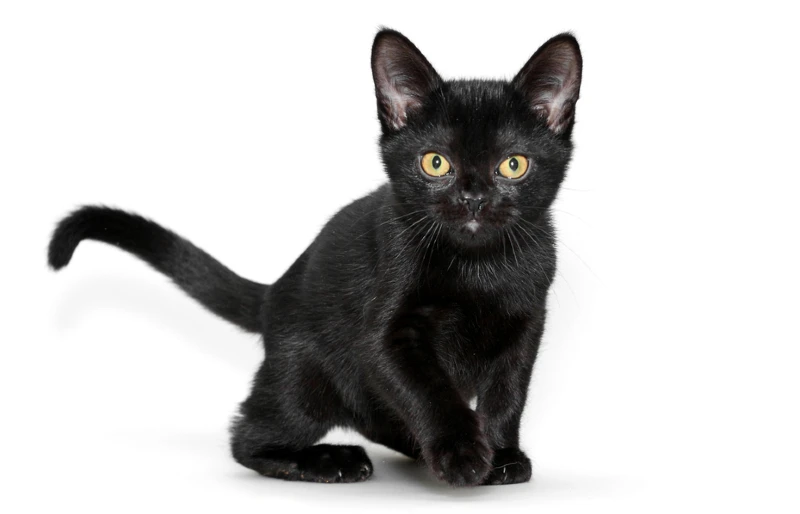
Junior (6 months to 2 years)
Prime Adult (2 to 6 years)
Mature Adult (7 to 10 years)
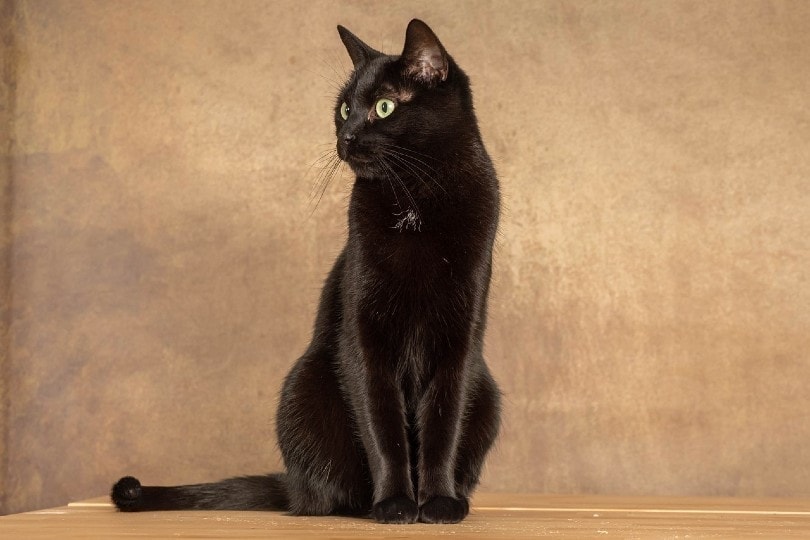
Senior (10+ years)

How to Tell Your Bombay Cat’s Age
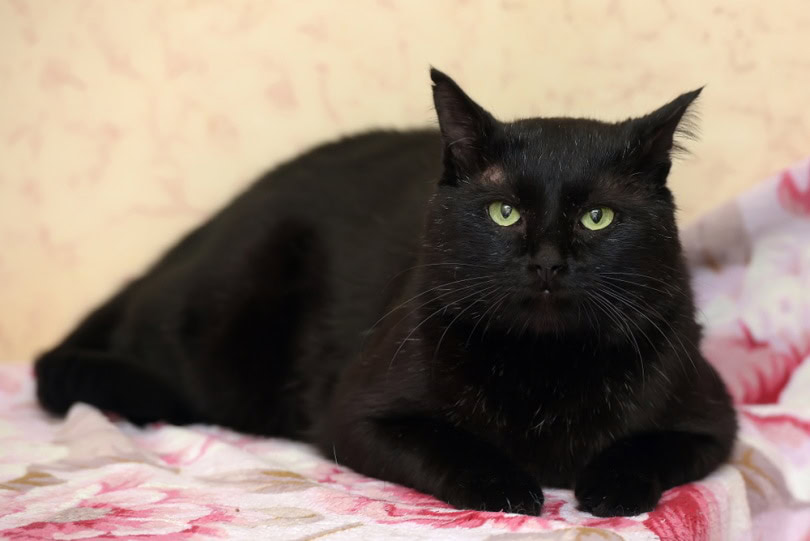

Conclusion
